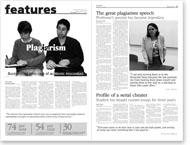The Carillon, Vol. 52, Issue 22 | March 25 – 31, 2010
Plagiarism is one of those problems in academia that will likely never disappear, and it’s not hard to understand why. Personal problems, apathy, frustration, the pressure to succeed, and looming deadlines – any one or combination of these can produce conditions where copying someone else’s work or paying for someone else to handle your problems can seem like an attractive option.
It happens a lot. According to a U.S. national survey by Education Week, 47 per cent of students believe their teachers sometimes choose to ignore students who are cheating, 54 per cent admit to having plagiarised from the Internet and a whopping 74 per cent admit to have engaged in serious academic misconduct. Similar results are reflected in other surveys; for instance, the Center for Academic Integrity found that 70 per cent of 50,000 undergraduates on 60 campuses admit to some form of cheating.
Academic misconduct is a blanket term for a number of offences, including plagiarism, which is defined by the University of Regina as “a form of academic dishonesty in which one person submits or presents the work of another person as his or her own, whether from intent to deceive, lack of understanding, or carelessness.”
Plagiarism can range from unintentional to deliberate, and includes buying custom essays, turning in the work of another, turning in a paper from a “free term paper” website, and failing to cite documentation or sources properly.
Don Sharpe deals with academic misconduct in the Faculty of Arts as part of his responsibilities as Associate Dean of Arts Undergraduate. Last semester, he dealt with 30 reported cases of academic misconduct.
“It’s something the university obviously takes very seriously and I take it very seriously as part of my job. A good chunk of my job is to educate students about what we consider plagiarism to be and how to avoid it.”
Catching a plagiarist is a lengthy process involving a fair bit of paperwork. A professor must pinpoint the passages suspected of being plagiarised, find the source document(s), write a formal letter outlining the charge, and explaining how plagiarism has been addressed in the course. Once this package is delivered to the Associate Dean, the student is then invited to come in for a meeting to discuss the charge and then a decision is made. The consequences depend on the severity of the plagiarism.
The minimum punishment, for limited first-time offences, is a reduction of 20 percentage points on the assignment. Buying an essay, or resubmitting one from another class, results in a grade of zero for the entire course. In more extreme cases, students can be expelled and degrees can be rescinded.
While the Internet has made the detection of sloppy cut-and-paste plagiarism much easier, it has also generated a kind of arms race as plagiarists have increasingly moved to downloading free papers or patronizing online custom essay-writing services. The latter are much harder to catch, as simple Google searches will not reveal them. With a short email and an online bank account or credit card, anyone can order an original assignment.
One such website proclaims: “Let the most trusted essay writing service in the industry assist you. Professional essay writers with MA and PhD degrees are ready to help you write your essay, term paper or other assignment … The custom essay writing that we provide will save your time and money, guaranteed.”
Preventing plagiarism is an ongoing process that demands vigilance. Professors often require topic proposals, rough drafts, and photocopies of source material in order to discourage dishonesty. They will also discuss plagiarism with the students, often beyond merely parroting the mandatory policy that must be read out on the first day of classes.
Detection involves looking for unusual details, such as odd formatting, jargon, and various other incongruities. Often the paper simply doesn’t feel right. From there, professors can often track down sources on the web or by consulting library references. Several hours of paperwork and meetings later, a sentence is handed down, and a life or career may be permanently stained for the sake of saving a few hours of work.



